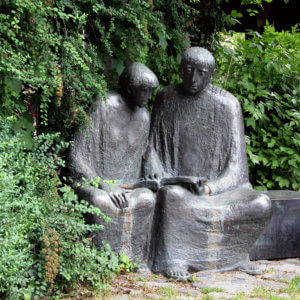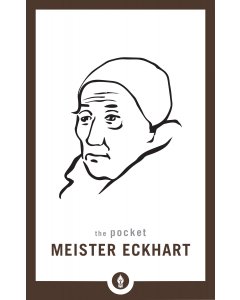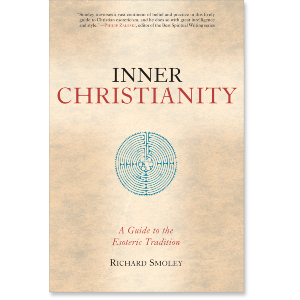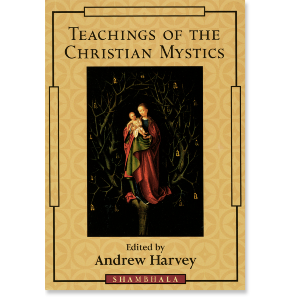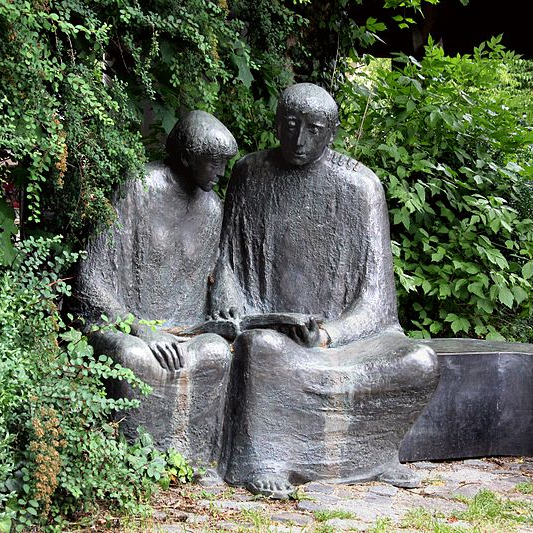

Meister Eckhart
Meister Eckhart (1260–1327) was a German Dominican theologian and popular preacher who believed that God is best approached through paradox and mystery rather than through reason or logic. His works have rung true with seekers for more than eight hundred years.
Meister Eckhart
-
 Meister Eckhart, from Whom God Hid Nothing$17.95- Paperback
Meister Eckhart, from Whom God Hid Nothing$17.95- PaperbackBy Meister Eckhart
Edited by Dave O'Neal
Foreword by David Steindl-Rast
GUIDES

The Book of Divine Consolation | An Excerpt from The Pocket Meister Eckhart
First of all, one should know that the wise man and Wisdom, the true man and Truth, the just man and Justice, the good man and Goodness, are related to each other and are proportioned to one another as follows: Goodness is neither created nor made nor born; but it is giving birth and brings forth the good man, and the good man, in as far as he is good, is unmade and untreated, and is yet the child and son of Goodness. Goodness gives birth to itself and to all it is in the good man: being, knowledge, love, and operation—it pours it altogether into the good man, and the good man receives all his being, knowledge, love, and operation from the heart and inmost part of Goodness and from it alone. The good man and Goodness are nothing but one goodness, completely one in all things, except for the giving birth and the being born, and yet the giving birth of Goodness and the being born is in the good man altogether one being, one life. All that belongs to the good man he receives from Goodness in Goodness. There he exists and lives and dwells. There he knows himself and all that he knows, there he loves all that he loves and operates with Goodness in Goodness, and Goodness with him and in him all its works, according as it is written and the Son says, “The Father abiding in me doeth his works.” “The Father worketh even until now and I work.” All that is the Father’s is mine, and all that is mine and of mine is my Father’s: his in giving and mine in receiving.
One should know further that if we speak of the “Good,” the name or word signifies and includes nothing else, no less and no more, than goodness pure and simple; nevertheless, we then mean the good in so far as it gives itself. If we speak of the “good man,” we mean by this that his goodness is given, infused, and inborn in him from the unborn Goodness. Therefore the Gospel says, “As the Father hath life in himself, even so gave he to the Son also to have life in himself.” He says, in himself, not of himself, for the Father has given it to him.
All that I have now said of the good man and of Goodness is equally true of the true man and Truth, of the just man and Justice, and of the wise man and Wisdom, of the Son of God and God the Father, of all that is created, that is not God, in which there is no image save the pure, sheer God alone. For thus says Saint John in his Gospel, that to all those he gave power to become sons of God, who were born “not of blood, nor of the will of the flesh, nor of the will of man, but solely of God.”
One should know further that if we speak of the “Good,” the name or word signifies and includes nothing else, no less and no more, than goodness pure and simple; nevertheless, we then mean the good in so far as it gives itself.
By “blood” he means all in man that is not subject to man’s will. By “the will of the flesh” he means all that is, indeed, subject in man to his will, yet with aversion and revolt, inclining to the desires of the flesh and belonging to soul and body together and that is not actually to be found only in the soul; and consequently the powers of the soul grow tired, weak and old. By the “will of man,” Saint John means the highest powers of the soul whose nature and working is not mixed with the flesh and which are in the purity of the soul, separated from time and space and from all that still has some interest or pleasure in time and space. These powers have nothing in common with anything, in them man is modeled on God, of the race of God and of the family of God. And yet, since they are not God himself and are created in the soul and with the soul, they must be de-formed of themselves and transformed into God alone and be born in God and from God, so that God alone should be their Father, for thus they are also sons of God and God’s only son. For I am the son of all that forms me and gives birth to me as equal to and in itself. In so far as such a man, son of God, good as the son of Goodness, just as the son of Justice, is solely its [i.e. of justice] son, it is giving birth without being born, and the son to whom it has given birth has the same being as Justice has and is and enters into the possession of all that belongs to Justice and Truth.
All this teaching that is written in the holy gospel and is known with certainty in the natural light of the reasonable soul gives man true consolation for all his suffering.
Saint Augustine says: For God nothing is far or long. If you want nothing to be far or long for you, unite yourself to God, for there are a thousand years as the day that is today. In the same way I say: In God there is neither sorrow nor suffering nor tribulation. If you would be free from all tribulation and suffering, attach and turn yourself purely and wholly to God. To be sure, all suffering arises only from the fact that you do not turn solely toward and into God. If you were only formed and born in justice, indeed, nothing could cause you suffering, as little as justice God himself. . . . Therefore man shall take much care to detach himself from himself and from all creatures and to know no father save God alone. Thus nothing can make him suffer or feel sorrow, neither God nor creatures, neither created nor uncreated things, and his whole being, life, knowledge, understanding, and loving is from God and in God and God.
There is something else that should comfort a man. If he is ill and his body is in great pain, yet having his home and all he needs of food and drink, medical advice and the service of his domestics, the sympathy and assistance of his friends: how should he then behave? What do the poor, who have the same or even greater illness and misery to bear and have no one to give them even cold water? They must beg their dry bread from house to house, in rain, snow, and cold. If you therefore want to be comforted, forget those who are better off and always think of those who are in a worse state.
I say further: All suffering comes from love and affection. If I then suffer because of transitory things, I and my heart have still love and affection for transitory things and I do not cherish God with all my heart, and I do not yet love what God wants to be loved by me and with him. How, then, is it surprising that God should allow me rightly to suffer pain and sorrow?
Saint Augustine says: “Lord, I did not want to love you, but I wanted in my greed to possess the creatures with you; and therefore I lost you, for it is repugnant to you that one should possess the falsity and deceit of the creatures together with you, who are the Truth.” He also says elsewhere that he is too greedy to whom God does not suffice. And again, in another place: “How could a man be satisfied by God’s gifts in the creatures who is not satisfied by God himself?” A good man should not find comfort but pain in all that is alien and different from God and not wholly God himself.
Now I will speak of something else. He cannot be a good man who does not will what God wills in every particular case, for it is impossible that God should will anything but good; and precisely in and through that God wills it, it is necessarily good and even the best. And therefore our Lord taught the apostles and us in them to pray every day that God’s will should be done. And yet, if God’s will comes to pass, we complain.
If you would be free from all tribulation and suffering, attach and turn yourself purely and wholly to God.
Seneca, a pagan master, asks: What is the best comfort in suffering and tribulation? And he answers: It is this, that a man should take all things as if he had desired and asked for them. For if you had known that all things happen from, with, and in the will of God, you would indeed have wished for them. A pagan master says: Prince and supreme Father and Master of the high heavens, I am ready for all you will; give me the will to will according to your will.
A good man should trust God in this, believe him and be certain and know him to be so good that it is impossible for God and his goodness and love to permit that any suffering or sorrow should happen to a man, except that he wants to spare man a greater sorrow or the better to console him even on earth or to bring a greater good out of it from which God’s honor would appear better and more strikingly. However that may be, for the sole reason that it is God’s will that this should happen, the will of the good man ought to be so completely one and united with God’s will that man wills the same as God, even though it be to his own detriment, indeed his damnation. Therefore Saint Paul desired to be separated from God for God’s sake and for the sake of God’s will and God’s honor.
A man should also think in his suffering that God speaks the truth and makes promises in his own name as being the Truth. If God forsook his word, his truth, he would forsake his godhead and would not be God, for he is his word, his truth. Now his word is that our sorrow shall be turned into joy. Surely, if I knew for certain that all my stones should be changed into gold, the more and the larger stones I had, the better I should be pleased.
Another, similar example: No container can hold two kinds of liquid. If it is to hold wine, we must necessarily pour out the water; it must become empty and void. If, therefore, you are to receive divine joy and God, you must necessarily pour out the creatures. The more perfect and pure the powers of the soul, the more perfectly and fully they take in what they grasp, and the more they receive, the greater joy they will feel, the more they will become one with what they take in, so much so that the highest power of the soul which is stripped of all things and has nothing in common with anything, will receive no less than God himself in the breadth and fullness of his being. And the masters say that no other joy and delight can be compared with this union and this bursting forth and this delight. Therefore, our Lord says so remarkably: “Blessed are the poor in spirit.” Poor is he who has nothing. “Poor in spirit” means: as the eye is poor and devoid of color but receptive of all colors, so he who is poor in spirit is receptive of all spirit. Now God is the Spirit of spirits. The fruit of the spirit is love, joy, and peace. To be stripped, poor, to have nothing, to be empty—this transforms nature; the void causes water to climb mountains and performs many other marvels of which we would not now speak.
If, therefore, you want to have and find full joy and consolation in God, see to it that you are stripped of all creatures, of all consolation from creatures. For certainly, as long as creatures comfort and are able to comfort you, you will never find true comfort. But if nothing can comfort you save God, truly God will console you, and with him and in him all that is delight. If you are consoled by what is not God, you will have comfort neither here nor there. If, however, creatures do not console you and you do not enjoy them, you will find comfort both here and there.
Related Books
